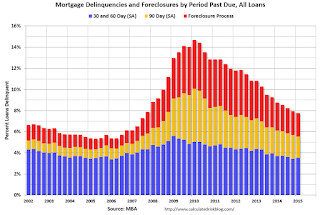by Calculated Risk on 5/06/2015 02:47:00 PM
Wednesday, May 06, 2015
MBA: Mortgage Delinquency and Foreclosure Rates Decrease in Q1, Lowest since Q2 2007
Earlier from the MBA: Mortgage Delinquencies and Foreclosures Fall in First Quarter
The delinquency rate for mortgage loans on one-to-four-unit residential properties decreased to a seasonally adjusted rate of 5.54 percent of all loans outstanding at the end of the first quarter of 2015. This was the lowest level since the second quarter of 2007. The delinquency rate decreased 14 basis points from the previous quarter, and 57 basis points from one year ago, according to the Mortgage Bankers Association's (MBA) National Delinquency Survey.
The delinquency rate includes loans that are at least one payment past due but does not include loans in the process of foreclosure. The percentage of loans in the foreclosure process at the end of the first quarter was 2.22 percent, down five basis points from the fourth quarter of 2014 and 43 basis points lower than the same quarter one year ago. This was the lowest foreclosure inventory rate since the fourth quarter of 2007.
...
"Delinquency rates and the percentage of loans in foreclosure continued to fall in the first quarter and are now at their lowest levels since 2007," said Joel Kan, MBA's Associate Vice President of Industry Surveys and Forecasting. "The job market continues to grow, and this is the most important fundamental improving mortgage performance. Additionally, home prices continued to rise, as did the pace of sales, thus increasing equity levels and enabling struggling borrowers to sell if needed."
"The foreclosure inventory rate has decreased in the last twelve quarters, and now is at the lowest level since the fourth quarter of 2007. The rate, at 2.22 percent, was about half of where it was at its peak in 2010. With a declining 90+ day delinquency rate and the improving credit quality of new loans, we expect that the foreclosure inventory rate will continue to decline in coming quarters. Foreclosure starts decreased one basis point from the previous quarter, and continue to fluctuate from quarter to quarter mainly due to state-level differences in the speed of the foreclosure process. At 0.45 percent, the level of foreclosure starts is at its long run average.
...
Around 40 percent of loans serviced are in judicial states and these states continue to have a foreclosure inventory rate that is well above that of non-judicial states. For states where the judicial process is more frequently used, 3.64 percent of loans serviced were in the foreclosure process, compared to 1.22 percent in non-judicial states. States that utilize both judicial and non-judicial foreclosure processes had a foreclosure inventory rate closer that of to the non-judicial states at 1.43 percent.
...
"Legacy loans continue to account for the majority of all troubled mortgages. Within loans that were seriously delinquent (either more than 90 days delinquent or in the foreclosure process), 73 percent of those loans were originated in 2007 or earlier, even as the overall rate of serious delinquencies for those cohorts decreases. More recent loan vintages, specifically loans originated in 2012 and later, continue to exhibit low serious delinquency rates."
emphasis added
 Click on graph for larger image.
Click on graph for larger image.This graph shows the percent of loans delinquent by days past due.
The percent of loans 30 and 60 days delinquent are back to normal levels.
The 90 day bucket peaked in Q1 2010, and is about 75% of the way back to normal.
The percent of loans in the foreclosure process also peaked in 2010 and and is about 70% of the way back to normal.
So it has taken about 5 years to reduce the backlog of seriously delinquent and in-foreclosure loans by over 70%, so a rough guess is that serious delinquencies and foreclosure inventory will be back to normal near the end of 2016 (although progress has slowed). Most other mortgage measures are already back to normal, but the lenders are still working through the backlog of bubble legacy loans.


